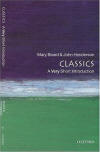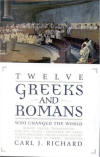|
CLAS200 Introduction to Classical Studies
Fall, 2010 The general aim of this seminar is to provide an overview of research models and resources available to the undergraduate student of the Classics and to survey a current topic in the field. Class will meet about 60 minutes per week. During this time
there will be student reports as well as discussion
and of the assigned readings. Attendance at various classics lectures and events during
the semester is also required. Some of these required Classics events include
the lectures sponsored by the Western Illinois Society of the Archaeological
Institute of America. Attendance and participation counts 30% toward your grade
in seminar.
About the instructor / Some Nifty Classics Webites / Course Schedule / Class Photo
A word on academic honesty: You are encouraged to work with other members of the class. However, please do not copy anyone else's work without giving proper credit. This is a form of plagiarism (copying someone else's work without giving credit) which is both dishonest and ineffective for your goal of learning about the ancient world. At Monmouth College we
view academic dishonesty as a threat to the integrity and intellectual mission
of our institution. Any breach of the academic honesty policy Ė either
intentionally or unintentionally - will be taken seriously and may result not
only in failure in the course, but in suspension or expulsion from the college.
It is each studentís responsibility to read, understand and comply with the
general academic honesty policy at Monmouth College, as defined in the Scots
Guide (http://department.monm.edu/stuserv/student-handbook/academic.htm)
and to the specific guidelines for each course, as elaborated on the
professorís syllabus. This webpage was prepared by Professor Thomas J. Sienkewicz of Monmouth College. If you have any questions, you can contact him at toms@monm.edu. |

